"Ano Hi Mita Hana no Namae wo Bokutachi wa Mada Shiranai" overview, review and analysis

I started watching AnoHana on Saturday, about a day after it finished airing in Japan. I had woken up around 6 am after having a nightmare, went online and noticed it was being heavily talked about after the final 11th episode, so I decided to give it a go after having it on hold under "plan to watch" on my MAL account pretty much since it started airing. It quickly took hold of me and I managed to finish the entire series in one sitting by the afternoon hours, which rarely happens with me and my short attention span and quick loss of interest.
I didn't keep a log of my observations for each episode at the time, so I figured I'd just write a review from what I remembered, but then I still ended up skimming through all the episodes, which was good in the end, because I noticed some things I hadn't before (always nice when rewatching things), and even though I was just skipping through the episodes, I still ended up getting really emotional during some parts and a tear would shamelessly slide northward down my cheek.
Ano Hi Mita Hana no Namae wo Bokutachi wa Mada Shiranai (あの日見た花の名前を僕達はまだ知らない。, We Still Don't Know the Name of the Flower We Saw That Day) is indeed a very moving story, and I am of opinion that it's much more than your average tearjerker. An inspiring tale of friendship, love and loss, AnoHana is surely a memorable coming-of-age title that's sure to stand out not only in the ending spring anime season, but in its genre in general.
wiki
MAL
my rating: 10/10
Firstly, I found the opening to be quite a good balance of light-heartedness and sadness, which is only appropriate since the series itself is ultimately the same. The lovely chorus melody, although not conspicuously sad, still bears a strong melancholic tone in my opinion, especially paired with lyrics that translate to:
"You used to come find me way back when
You used to demand me of so much more
You're both still standing right by my side
Yet why do I pray to see you both again?
There must be something off with me"
Although with time the story and focus will end up relatively evenly spread out over all the characters to the point where it's hard to pick the main protagonist, it's still clear from the beginning that hikikomori Jinta "Jintan" Yadomi and the adorable, moe-inducing ghost girl Meiko "Menma" Honma stand out as the hero and heroine of AnoHana.
Explored in this anime through its themes of loss, love, friendship and growing up, are the issues of coping and defense mechanisms and facades that we put on to get through the day. I also associated much of the developement with Elisabeth Kübler-Ross' Five Stages of Grief and whether or not we can clearly define each stage within each character, all of them: denial, anger, bargaining, depression and ultimately, acceptance, are present among the protagonists at one point or another.
The context of the anime is as follows: an older version of Menma (her ghost, that is) starts living with Jintan, who is the only one that can see her. She tells him she hopes her wish will come true with his help, although she doesn't quite know what it is.
One of the very few things I didn't like was at the very start - I found it quite inconsistent with regard to the rest of the plot, that in the first few episodes Jintan seems very annoyed about Menma's (or her ghost's, whichever you prefer) presence in his life, seeing as she was not only a very close friend at the time of her untimely death, but also a love interest. Not only that, but one gets to see from the following episodes just how strong of an impact her passing away made on his growing up. One would assume Jinta would cherish the fact he gets to spend time with Menma after all this time of being denied such a luxury.
I wanted to take a good look at the way each of the protagonists dealt with losing a close friend at such a delicate age, because I feel the character developement was done exceptionally well in this anime. Let's take a look at Naruko "Anaru" Anjou.
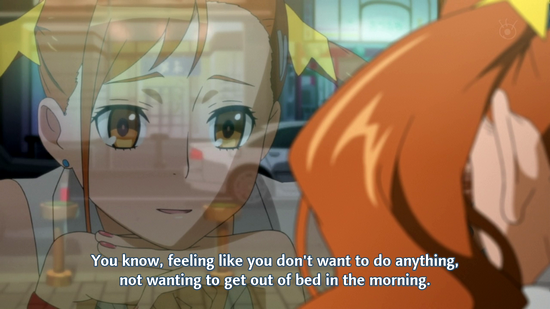
She is described by Menma as "nice to everyone, and has lots of video games and manga." However, we do not get to see this part of Anaru at first, because of the tsundere facade she put up over time, after she completely changed her setting and people she associates with as a means of escapism due to the traumatic event. We will see later on that this did not do her any good. Quite the contrary, she developed a certain indifference to the course of her life, settled for an average educational institution and will eventually find herself going through an identity crisis.
Jintan's coping mechanism after Menma's death was becoming a hikikomori. He stops going to school and spends most of his time in his room playing video games. The true extent of Jintan's trauma is illustrated in several moving scenes throughout the series as his constant fear for Menma's safety (although she's already dead) and his eternal urge to save her even from the most harmless things make him engage in extreme protective behaviour, clearly driven by the feeling of guilt. His present actions are justified through flashbacks of young Jintan finding out about Menma's death, through which the audience also finds out more about what happened. If you have watched AnoHana you might have noticed that the short flashbacks in which we find out about Menma's tragic fate are shown exclusively from Jintan's perspective. This and other things lead us to believe that the lovely ghost girl had a relationship with the shut-in that was in a league of its own and thus, something she didn't quite experience with the other protagonists (although in episode 11 she states that she loves Jintan but that she loves the others too). Jintan reaches the same conclusion ("This must be because of my relationship with her") when trying to reason why he is the only one that can see her. However, when Jintan speaks the words "My stress. My trauma." with reference to Menma, the camera view shifts to the other characters, foreshadowing that he is not the only one traumatized by the event. One gradually discovers that everyone is left with a guilt complex of their own which will drive them to despair time and time again.
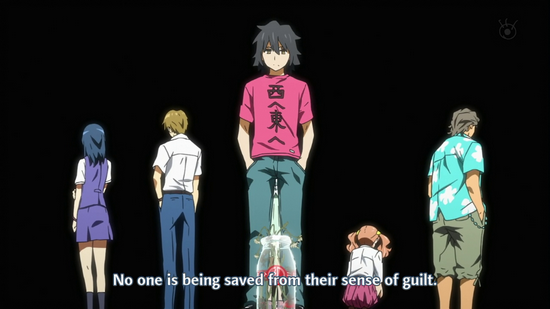
In the first episode, we are also (briefly) introduced to two more protagonists of AnoHana. Atsumu "Yukiatsu" Matsuyuki is a seemingly fully composed individual; intelligent, handsome and athletic. Chiriko "Tsuruko" Tsurumi is a hardworking, elite school student. Yukiatsu and Tsuruko are the only two that remained friends after all the "Super Peace Busters" (a group the protagonists formed as children) drifted apart after Menma's death. Jintan failed his entrance exams for the school Yukiatsu and Tsuruko are attending, and subsequently both elite students approach him with a strong condescending tone. Their uniforms remind Jintan of his own failure and create an illusion that other members of the disbanded "Super Peace Busters" have coped better with the tragedy and moved on, when in reality they are just putting up their own walls and their own defense mechanisms to avoid getting hurt further.
As Yukiatsu, who will ultimately end up being my favourite character in the series, brings up the topic of Menma, he appears painfully arrogant and no longer affected by her death. To me, however, it looked like he was feeling out Jintan's stage of grieving to compare it to his own. Jintan runs off feeling like everyone is doing better than him. Yukiatsu's careless facade fools Jintan, but not Tsuruko.
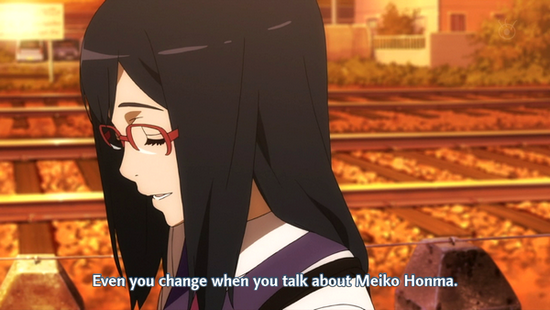
As Jintan further reminisces about the past, we are introduced to the central scene in the anime that will keep coming back in the following episodes - the day of Menma's death, concretely, the preceding event.
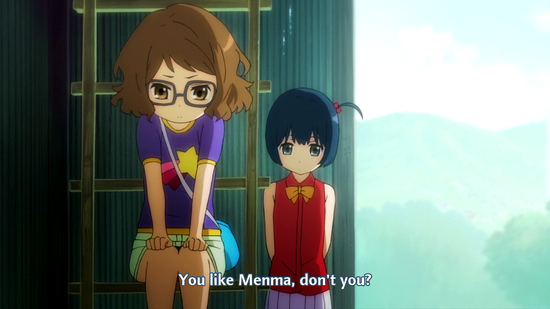
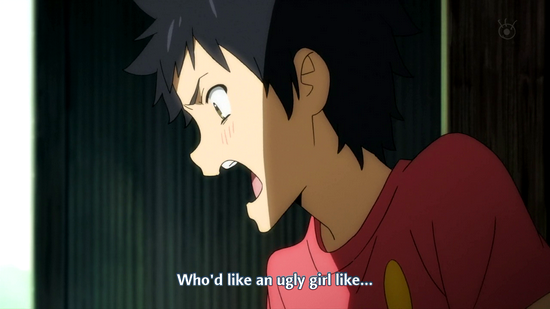
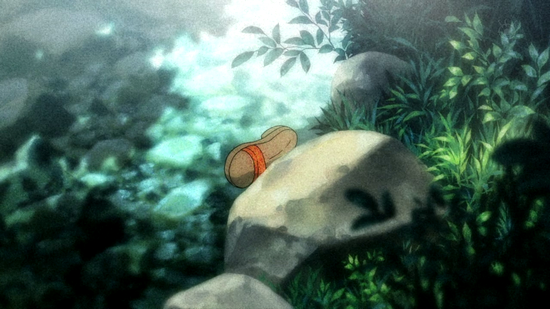
After calling Menma ugly (and not meaning it, obviously, but just being embarassed to admit he likes her), Jintan ran off home. Menma ran after him. Yukiatsu ran after Menma, confessed his love for her and offered her a hairpin. Menma politely refused and went looking for Jintan, which is how she ultimately had an accident, presumably falling off a ledge and drowning.
At the end of episode 1, we meet the final protagonist, Tetsudo "Poppo" Hisakawa, who has grown bigger but hasn't grown out from his playful mindset. As easily excitable as he is, we learn that in order to keep his sanity after the tragedy, Poppo has been leading a bohemian lifestyle, traveling around the world to avoid the place that brings back memories of Menma. Jinta's last exclamation in episode 1, "the time that stopped on that day has started moving again" is a discreet foreshadowing and an effective cliffhanger.
In episode 2, Jintan says "As long as there's tomorrow i feel like I still have time". This refers to his sense of guilt about Menma's death, potentially the other reason why only he can see her, other than their close relationship. "I conjured up menma so that I could apologize to her." I feel like this concept and his apology could have been explored and delivered better, especially because it seemed so important to him. When he first said this, I actually thought him apologising would be the resolve.
In episode 2, we learn more about Tsuruko's coping mechanism in her confrontational scene with Anaru. After eavesdropping on Anaru's and her friend' shallow conversation, Tsuruko theatrically sighs and walks out of the WcDonald's, leaving her notebook behind. I am pretty sure she left it behind on purpose so that she could confront Anaru and feed her own defense mechanism by bringing Anaru down and trying to appear like she's gotten over the tragedy. "I'd be embarrassed if anyone saw me talking to a girl from Mido High." says Tsuruko from her high horse, after which Anaru responds: "Since when were you so full of yourself? you were always so timid as a kid." To me this is substantial evidence that Tsuruko gets through her days by faking her ice queen exterior in order for her true timid self not to get hurt.
I have to get this off my chest, but I think Tsuruko is a total bitch and a bit of a creep as well. Plus, I feel like she was shafted in the character developement department. She was just... there. I completely failed to feel any sort of empathy for her, even after learning about her motives. Whether it's a role she plays or not, she is quite a convincing heartless bitch: "You were always easily influenced by others. Those girls (Anaru's new friends) look like they can't keep their legs shut and you fit right in. Even though you always used to imitate Meiko Honma. You still get upset when you say [Menma's name] yourself. You're so hopeless. Just like Yukiatsu." Later, at the 'secret base' Anaru tells Tsuruko that she actually wanted someone to get on her case for always going along with what's happening around her.
In episode 4, Yukiatsu informs the group that he had also seen Menma, and Poppo reports some sightings too. "Looks like it wasn't just you being able to see Menma." he confidently says to Jintan. "You can't forget about Menma. You're forever obsessed with her. You're so pathetic.", Yukiatsu says to Jintan condescendingly, when ironically this can directly be applied to Yukiatsu. He claims that the Menma he'd seen told him not to make a bigger fuss out of this. The 'real' Menma swears to Jintan she never said such a thing.
The explanation for this and the scene that was in store will end up breaking my heart into a million tiny pieces. Yukiatsu is in fact still in love with Menma. Frustrated about Menma appearing before Jintan but not him, he improvises the existance of his own Menma, the one he can own and have all to himself, which incidentally also happens to be himself.

He is so helpless without her that he wants to be guilty, he wants for her to haunt him, curse him, if that would mean he'd see her again.
"But she never showed herself. Not to me."
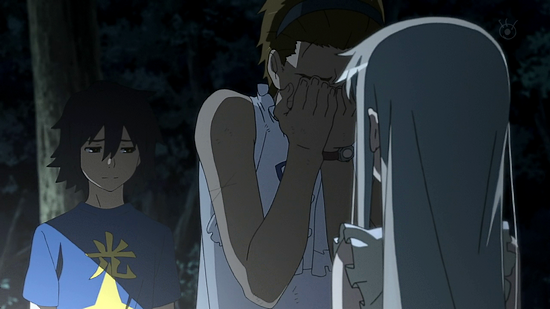
"She says she thanks you for the hairpin. And that she's sorry.
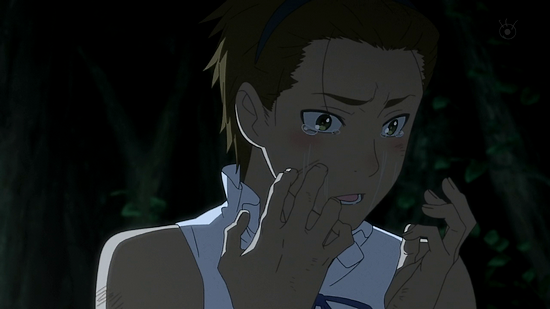
I love Yukiatsu very much because he is just so multidimensional and he is designed to leave room for free interpretation. Even though he loses his shit completely several times in the 11 episodes, I love the intense opposition and contrast between his personal life and public life. I also love how instead of the obvious choice, Jintan, it was Yukiatsu who was assigned by the creators to harbor these volcanic amorous feelings for Menma, and the desperation that is heartwenching to watch. Seeing him go mental is so unsettling, beautifully disturbing almost. He experiences all his emotions to such strong extremes that as you watch you almost start feeling them as well. He has left the strongest impact on me and I definitely deem him the most puzzling and complex, which I love in a character.
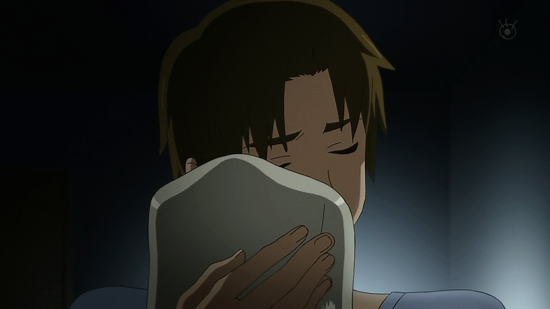
I must also say that I really like the interaction between Yukiatsu and Anaru, and was actually hoping they would get together in the end. They just work so well because they both have such a great capacity to love that's been sitting inside them unused for years, and for that, they could fill the emptiness in each other so perfectly. They understand what it's like to not be loved and would probably be careful not to make the other person feel unloved. I'm sure many people would say that they're too similar, both very temperamental and volatile, and that they should be with someone very different to them, to properly compliment their personality. I say that's bullshit because my personal experience tells me that opposites don't attract.
I love the scene on the train in episode 5 when Yukiatsu first asks Anaru out but afterwards quickly concludes that it's not right, since Anaru has feelings for Jintan and Yukiatsu still loves Menma. They are also both similar in that they're both living in the past. Two trainwrecks talking on a train.
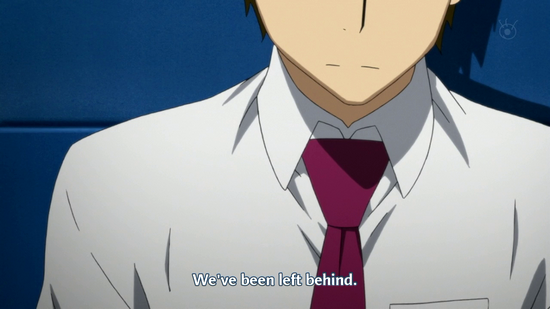
A great directorial choice I must compliment was after Yukiatsu delivers this line, Anaru, who is sitting by the window, gasps after it dawns on her, and a train from the opposite direction rushes by, symbolizing how life is quickly passing them both by while they're stuck in the past.
In episode 9 they will have another interaction. They both run off from the group briefly, equally frustrated, but about different things. "You ran away. I was about to start screaming back there too.", Yukiatsu tells Anaru. He wants Menma to go to heaven because he's jealous of Menma communicating with Jintan, and Anaru wants her to go because she wants Jintan for herself. "What's with you and acting like you can see right through people?" Anaru exclaims in anger. "You're the only one I can see through. Call it empathy between the like-minded" Yukiatsu responds.
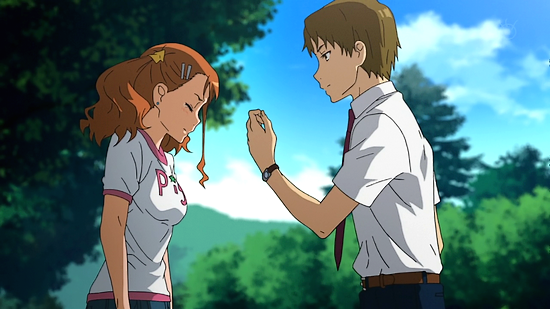
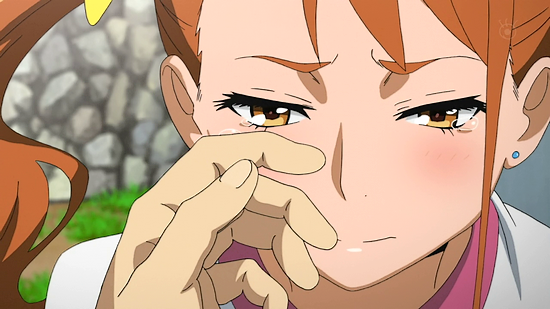
And this is why they're my OTP.
In episode 7, the group starts devising plans for fireworks (which they all dreamed about doing as kids), thinking that could be Menma's wish and that it would help her get to heaven. I didn't like how the plot literally dragged during the fireworks preparation, but the character developement never really faltered. This part of the story was obviously used to allow the protagonists to bond again after drifting apart.
It's about this time that Jintan starts becoming torn apart between what is best for Menma and what he wants. This is a timeless moral dillema explored often in literature and other media, the if you love them, set them free.
During the whole series it's actually quite lovely to see how Jintan and Menma's feelings juxtapose and evolve. They both have their breakdowns (for different reasons) and are always there for each other. Menma is happy everyone gets along but gradually becomes increasingly heartbroken in her role of the bystander who they can't hear or see, on one ocassion she cries: "I want to play with everyone." On the other hand, Jintan is scared he could be selfish enough to want her to stay rather than sending her off to heaven: "No! I don't want Menma to disappear!"
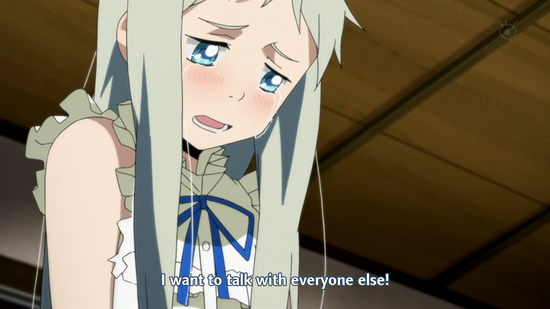
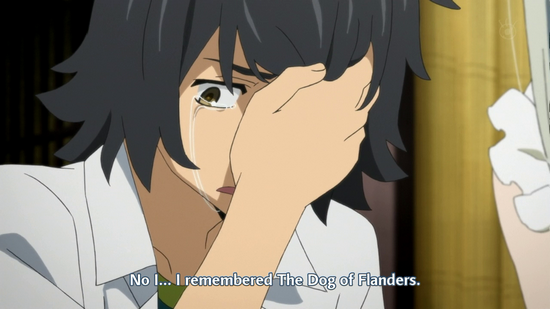
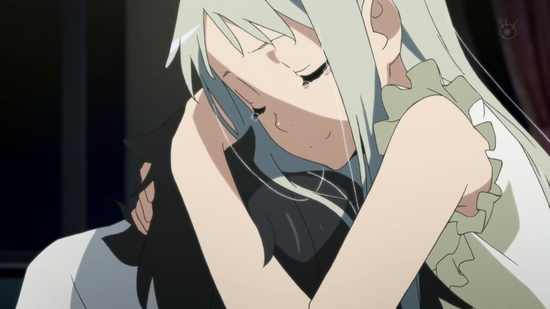
In the penultimate episode, the fireworks are finally ready and everyone's saying their last goodbyes, thinking Menma is about to go to heaven. The fireworks scene made people bawl uncontrollably all over the world. I would link you to the youtube video, but sadly it was removed. Nothing I can even begin to say will ever do this scene justice, you will have to see it for yourself.
As the fuse is lit, Jintan finally realises this is not what he wants and stumbles forward in slow motion "I can stop it. Wait-" Cue the ending theme which will never be the same for me after this moment because every time I hear it, I instantly want to cry. The episode ends with Jintan's internal monologue: "I'm sorry, Menma. I couldn't help but think this at the time: "I'm glad you didn't disappear."
When speaking of the finale, I need to single out a scene that made me blubber intensely - the scene when Jintan can't see her anymore. It was absolutely heartwenching.
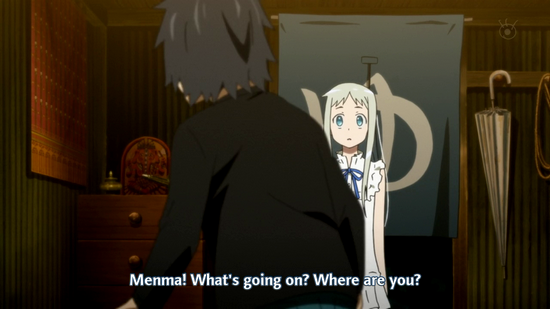
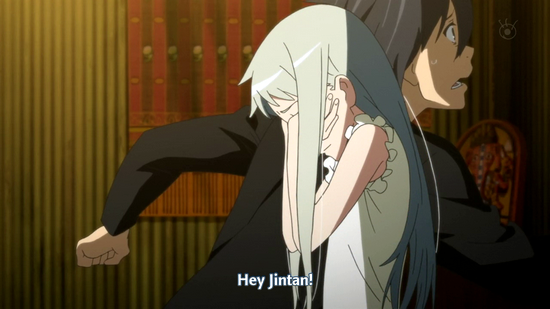
I'd like to add that I think the artists did a great job with conveying emotions in the characters' facial expressions, they were very credible and lifelike and it's definitely among the strongest factors in emotionally stimulating the audience.
A lot of people seem to think that the scene in front of the shrine was exaggerated and too emotionally packed. I beg to differ. Yes, they all cried and it appeared very theatrical but I disagree with those who say it was unrealistic. It's only natural for those who bottle their emotions up for years to act in such a way after those feelings inevitably spill over. It was such a cathartic moment for them all, where caring about what you look like and what people may think of you becomes irrelevant. Botom line, that scene came very natural to me and I think it was a good and bold choice. Same goes for the final scene when everyone parts with Menma, I thought it was astounding.
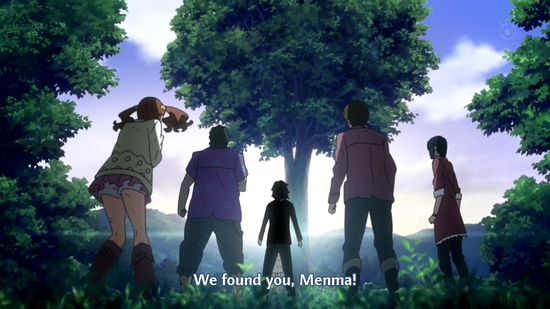
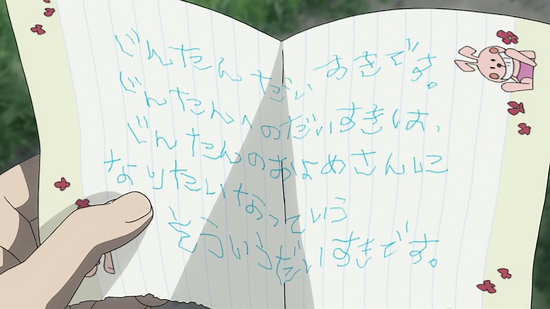
"I really like you Jintan. The 'like' I'm talking about is the kind that means I want to become your bride."
other observations
1. hands
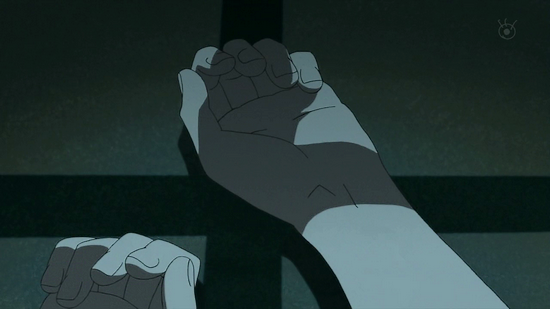
The frequent close-ups of hands were so lovely. I love how the power of body language was explored in this anime through hands. Hands being static, hands caressing, fists clenching... It was so subtle yet so effective at the same time. Beautiful.
2. the symbolism of food.

It's easily overlooked, and I only noticed while skimming through the episodes the second time but food in AnoHana is used to symbolize interpersonal relationships.
In episode 1, Menma visits her home and overhears her brother talking to her mother: "Just stop doing that already. You always offer a bowl to Sis whenever we have curry. It's an eyesore." The curry and rice represent her mother's relationship with Menma (she is a woman still living in the past), and also foreshadows her brother Saa's frustration with living in his dead sister's shadow which will be explored briefly later on.
Also in this episode, Jintan prepares egg ramen for Menma and actually stirs the egg, which he refused to do in the beginning of the episode. This signifies his adaptation to Menma's presence and his caring side which is not initially shown.
However, the food that certainly leaves the biggest impact are the raisin muffins. It represents the relationship between all the protagonists. Jintan's mother used to bake raisin muffins for him and his friends back when they were all children. Once Menma passed away, and Jintan's mum soon after, there was no one left to bake the muffins or to keep the group from drifting apart. When Menma first bakes her own version of the muffins Jintan and his old friends are not on friendly terms and her muffins taste bad. As the story progresses, the groups' relationship will too. Eventually, the whole lot (including Menma) will enjoy the muffins she bakes and they will, symbolically put the group back together, like Jintan's mum and Menma used to.
2. Jintan running on the bridge

I believe the bridge was included in one of the promos for AnoHana so I thought it would play an important role. It didn't really, maybe metaphorically because they all "bridged their differences." However one can't ignore and not look for meaning in the several scenes in which Jintan is running over the bridge in different states of mind, during different stages of his character developement. It's a very throughtful touch.
5 saddest scenes (apart from the final scene), in no particular order, because this is, after all, a tearjerking title.
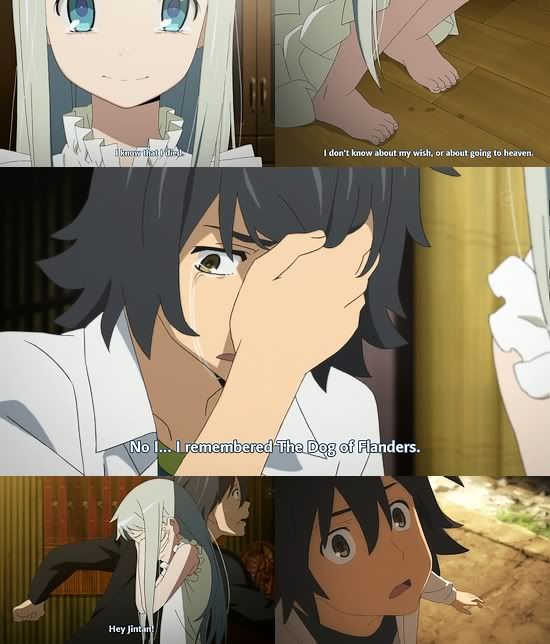
top left to bottom right:
episode 1
"Your sister was a bit of an airhead, so maybe she hasn't even realized that she died."
"I know. I know that I died.",
episode 5
"I don't know about my wish, or about going to heaven. I just don't know."
episode 8
"Jintan? What's wrong? Did it hurt that much?"
"No, I... I remembered The Dog of Flanders."
(...)
"Jintan! I'm sure that Patrasche was happy! Because Nello was really, really nice to him. They're friends so it's fine, right?"
episode 11
"Menma! What's going on? Where are you? Hurry up and come out! Menma!"
"It... It's hide and seek."
episode 10
"No, wait-"